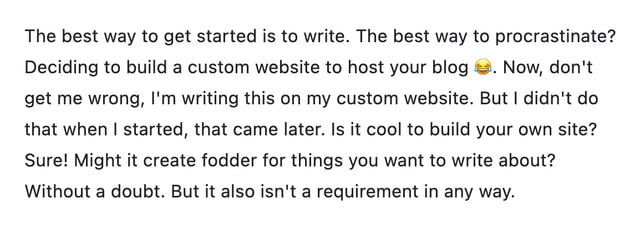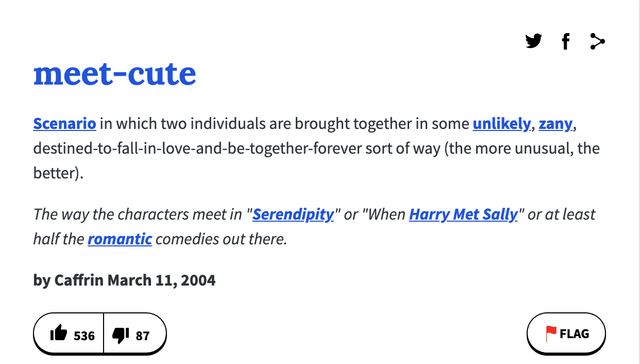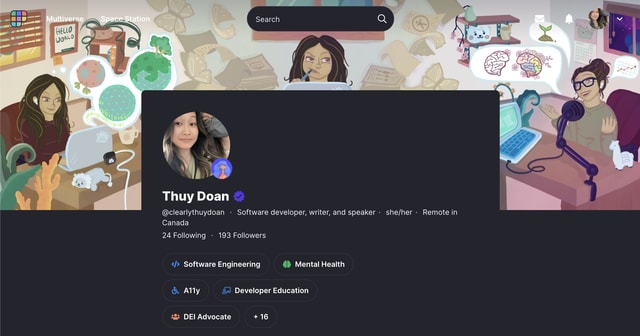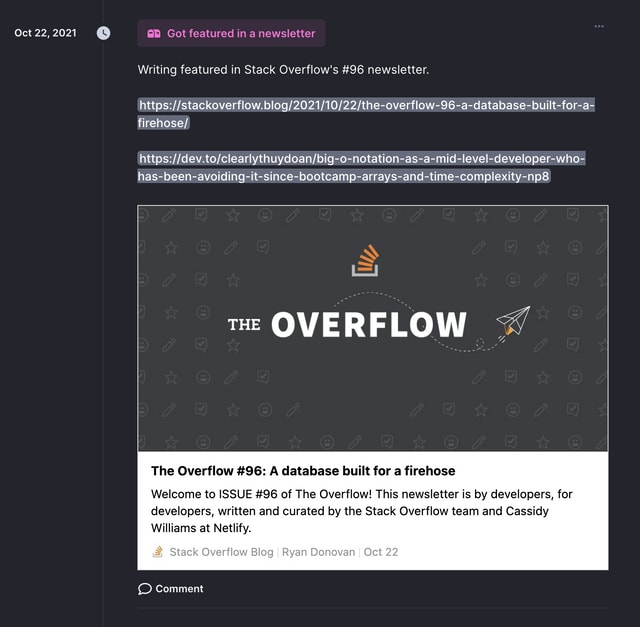I've been on social networks for a long time - as far back as 2005 if you count once-popular Myspace. You could even say that I'm ancient. From flexing my coffee addiction and Subway receipts as a regular on Twitter, to heavily filtered photos on Instagram before I embraced #NoFilter, to regaling other professionals with my career accomplishments (translation: extracurriculars when I was still in school), I've dedicated a lot of space online to expressing myself in the niche ways each platform was - and is still - built for.
 Been having one of these babies everyday for the past couple weeks. #coffeeproblems #necessary #noreally02:19 AM - 19 Nov 2012
Been having one of these babies everyday for the past couple weeks. #coffeeproblems #necessary #noreally02:19 AM - 19 Nov 2012
My Meet-Cute with Polywork
Source: Urban Dictionary
Earlier this year, I experienced two things that set in motion the series of events that would lead me to resigning from my dev job of almost five years to start a new opportunity: 1) I got rejected after years of not interviewing and 2) I started creating content again after a short, fun stint with a lifestyle blog.
Firstly, I interviewed for a developer position at [redacted] in April. For one reason or another, they didn't move forward with me and sent me a, "Thank you," email in May. That experience made me realize that I was rusty and needed to prepare better for the job market if I wanted to challenge myself somewhere else. Secondly, I found out that Developer Experience was a thing and that I was interested in pursuing it. As a result, I started interacting a lot with the creative developer community, for the first time since I became a developer myself in 2016, and from there I discovered Polywork.
At that time, I only had half of the equation to make the switch to Developer Experience (DX). I had developer experience and a personal brand but I did not have technical content produced for a developer audience.
I also realized - after looking at my dev career holistically - that in the last five years, I had not done anything to help uplift other developers. And that was a problem because it wasn't the person I wanted to be. I had to change that.
So I just started with what I knew or was learning: a talk on early career confidence, a guest podcast on getting into development from advertising, a blog on big o notation, and most recently, my own podcast. Pretty soon I had more than enough things to showcase. But, there was another problem.
I did not have a website. In fact, I hadn't had one since 2017.
Deterrents to Showcasing Work

Source: Laurie Barth
I don't know about you but building a personal website stresses me out. Which font / typography? What colour palette? Which technologies do I build it with? Can I justify why? What about a custom domain name? A cool one?
And then actually doing it...except your brain wants to hyper-fixate on something else. Like selling turnips for max profit!
Then what happens if some of the stuff you want to showcase only exists on Twitter? Sure, I've posted a lot (of arguably cool stuff) on there because ancient but it's way too unorganized on there. And then how about LinkedIn? Definitely a professional network but is it too stuffy for a podcast about mental health? That's a lot of stress when you have jobs to apply for.
Polywork took that where and how stress away for me.
Reducing the Friction with Polywork
My one line-description is Polywork is more in-depth and multi-dimensional than LinkedIn but less labour intensive than maintaining a personal website. (With features we know and love from Twitter and Instagram mixed in.)
For starters, similar to Twitter, it displays profile content in a timeline.
However, unlike Twitter, where both significant and inconsequential thoughts move by very quickly, buried underneath other quips - perhaps a culture influenced by the early tweet limit of 140 characters (now 280) - Polywork is instead more organized due to it prioritizing a curation of "Highlights".
Source: Polywork
Polywork also helps you organize by offering a feature called, "Collections". Similar to Instagram Highlights with Stories, you can group Highlights you have posted in the past into easy-to-view groups such as my Technical Writing collection. This way, when you're asked to provide samples of your writing or your dev projects on short-notice, you can just link the recruiter to your collection. No more precious real-estate lost on your resume and no more worrying about building that website in time for your job search.
Last but not least, Polywork encourages its users to share projects and accomplishments of all kinds - not just the kinds that are filtered enough for the crowd on LinkedIn. So you can post that new job along with that indie game you're building or that 10-hour Twitch stream full of expletives showing how you finished your CS project due that day. You have layers.
And Polywork knows this. People are multi-faceted.
To be clear, while I think Polywork is less labour intensive than building a website from scratch, Polywork is not a direct replacement for a website. I still intend to build one. Why? Because there's still value in owning your own content. However, if you find yourself blocked from showcasing your work because of the ol', "building my own site," are looking for a fast way to colourfully highlight projects in a way that's organized, professional, sharable and acts as an archive of your feats, or you're simply an early adopter of social networks, Polywork could be for you. Like it was for me 😬
Note: Polywork is currently a beta product that is invite-only. However, every current user is able to invite people to the platform. To join without being put on the waitlist, use my VIP code clearlythuydoan to join today.


















Latest comments (0)